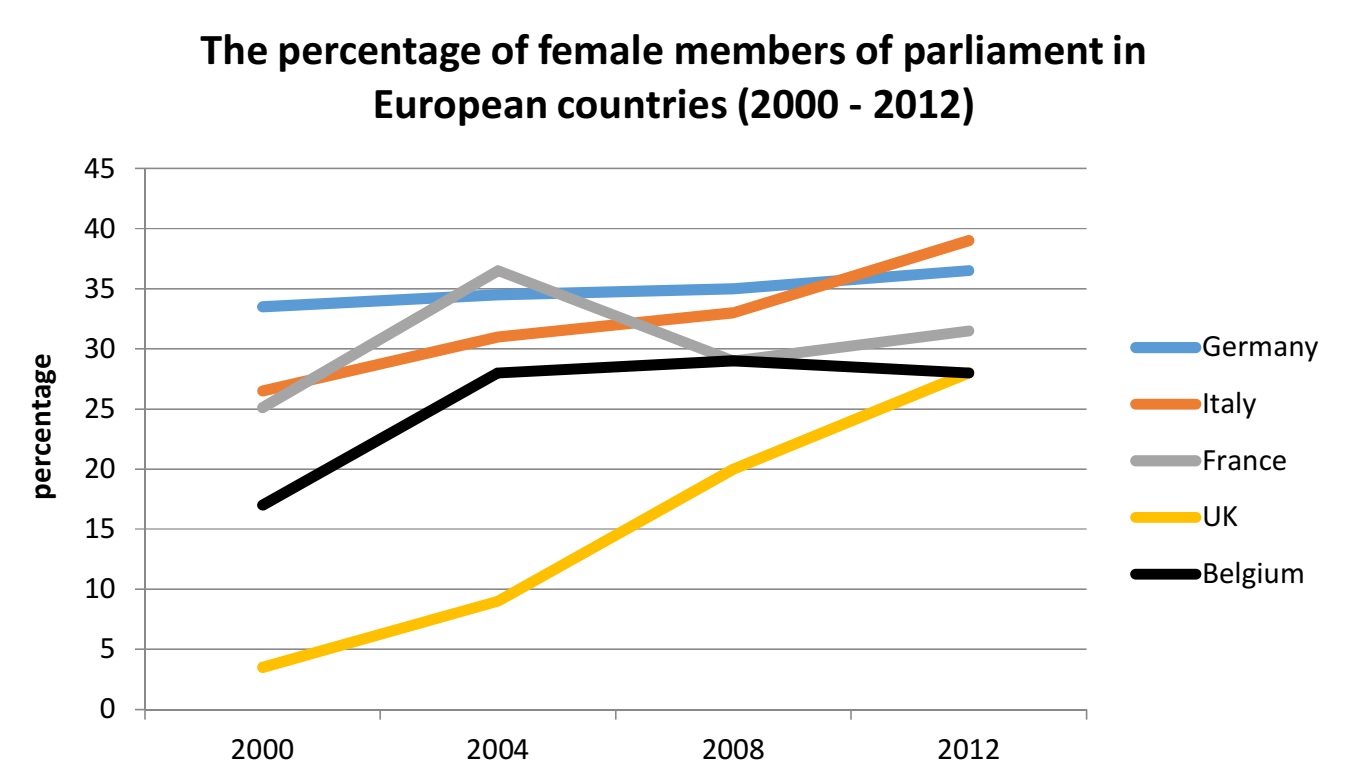IELTS Writing Recent Actual Test 65
WRITING TASK 1
You should spend about 20 minutes on this task
The line chart below gives information about the percentage of female members of parliament in European countries (2000 – 2012)
Write at least 150 words.

WRITING TASK 2
You should spend about 40 minutes on this task
Write about the following topic:
As the number of cars increases, more money has to be spent on road systems. Some people think the government should pay for this. Others, however, think that the user should cover the costs. Discuss both views and give your opinion.
Give reasons for your answer and include any relevant examples from your own knowledge or experience.
Write at least 250 words.
SAMPLE ANSWER IELTS WRITING TEST 65
WRITING TASK 1The line chart illustrates the proportion of female parliament members in Germany, Italy, France, the UK and Belgium from 2000 to 2012.
In general, all countries experienced an upward trend over the period, with Italy being the country with the highest percentage of female parliament members in 2012.
The percentages of female members of parliament in Germany and Italy were always higher than those of the other three countries however they also experienced a similar trend. While the figure for Italy rose from 27% to just under 40%, that of Germany increased by only 4%, to be at about 37%, during the examined period. Starting at 25% in 2000, the proportion of female parliament members in France increased at a similar rate to Germany, to end up at approximately 32% in 2012.
In 2000, only around 3% of parliament members in the UK were female, however this figure rose quite substantially to about 20% in 2008 and continued to peak at roughly 23% in 2012. The percentage of female parliament members in Belgium also stood at 23% in 2012, however this figure only showed a small change from its figure of around 17% in 2000.
(195 words)
WRITING TASK 2Opinions diverge widely on who should be responsible for road maintenance costs due to the proliferation of private cars recently. While some people argue that those who use cars should shoulder the responsibility for the improvement of road systems, I believe that such costs should be the liability of the government.
The principal reason why car commuters should take the responsibility for these costs stems from their overuse of roads. Compared to other means of transport like a motorcycle, a car obviously not only occupies much more road space, but also wears the roads more due to its larger size and weight. It was estimated in Thailand in 2015 that the number of private cars made up nearly 85% of total vehicles commuting on the roads to and from work. As a result, the need for the expansion and enhancement of roads is mainly to facilitate a more comfortable journey for car users. Therefore, it is reasonable to assign the costs to car owners to pay for the maintenance and enhancement of the infrastructure.
However, I believe that the expenditure for road infrastructure projects should be incurred by the government for the following reasons. Firstly, the main role of governments is to improve the citizens’ standard of living, and an efficient transportation system is just one of the residents’ basic needs. In fact, the efficiency in road transport is the backbone of a country’s economy, and therefore it would be wrong if governments did not give this top priority. Secondly, as in many countries, car buyers are charged an exorbitant amount of tax in order to own and drive a car on roads, and therefore it is unfair to solely lay the responsibility for road upgrade works on them. For example, people in Vietnam have to pay almost twice as much to own a car than in other countries since taxes and fees account for 40-50% of car prices. Therefore, it is better to use these taxes for road infrastructure investment, rather than forcing citizens to pay for it.
In conclusion, although the argument in favor of road infrastructure costs belonging to car owners might be convincing to some extent, I think that the government should be the one to take the full responsibility for this.
(376 words)
